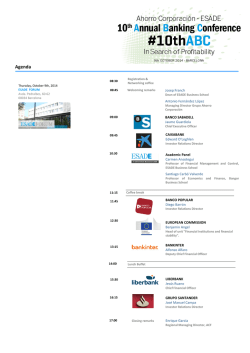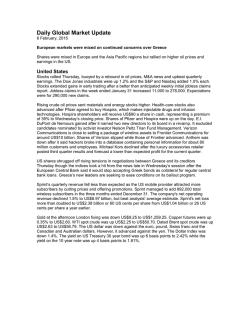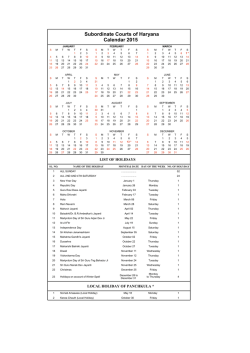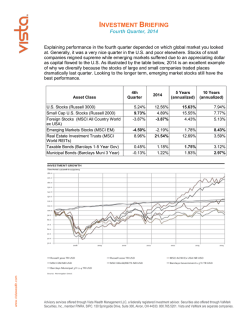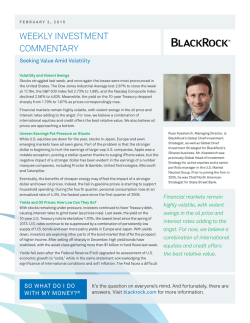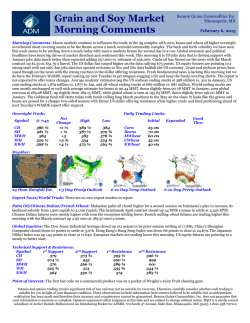
Guru Stock Report
Guru Stock Report AGCO CORPORATION (NYSE: AGCO) INDUSTRY: Constr. & Agric. Machinery Based on 1/29/2015 Close Price of $43.64 SECTOR: Capital Goods Reiterate B on 1/30/2015. Current Rating: Buy OVERVIEW • This stock receives a fundamental grade of "B" based on Validea's Guru Analysis system. "B" rated stocks pass the fundamental tests of at least one of our guru strategies, although they do not pass the top performing strategies required to receive an "A" grade. Stocks that receive this grade typically have mostly favorable fundamental attributes, although there are typically some minor flaws. For further details on our scoring system, please see the FAQ section at the end of this report. • Validea's Guru System classifies this stock as both a growth and value stock given its PE Ratio of 8.9 and its historical EPS growth rate of 29.7%. • This stock passes Validea's P/E Growth Investor strategy based on our interpretation of the published criteria of Peter Lynch with a score of 93%. The strategy looks for stocks that trade at a discount to their long-term earnings growth rates, which also show signs of financial strength. • This stock passes Validea's Price/Sales Investor strategy based on our interpretation of the published criteria of Kenneth Fisher with a score of 100%. The strategy looks for stocks that trade at low price/sales ratios that also meet several other strict financial tests. ANALYSIS SUMMARY Strategy Name Based On Book By/About Contrarian Investor David Dreman Score Book/Market Investor Joseph Piotroski Growth Investor Martin Zweig 38% Growth/Value Investor James O'Shaughnessy 50% Low PE Investor John Neff P/E Growth Investor Peter Lynch Value Investor Benjamin Graham Price/Sales Investor Kenneth Fisher Patient Investor Warren Buffett 0% Momentum Investor Validea 0% 47% 0% 0% 93% 86% 100% * Overall fundamental grade is based on a weighted scoring system in which the strategies at the top of the table are more significant than those at the bottom (the strategies used to determine our "A" rated stocks are above the dividing line in the table and the strategies used to determine the "B" rated stocks are below). Although all the strategies used in this report have exhibited market outperformance on a risk-adjusted basis, strategies at the top of the table have displayed superior historical risk-adjusted performance in our testing to those at the bottom. COMPANY PROFILE AGCO Corporation is engaged in manufacturing and distributing agricultural equipment and related replacement parts throughout the world. The Company sells a range of agricultural equipment, including tractors, combines, self-propelled sprayers, application equipment, hay tools, forage equipment, tillage, implements, engines, precision farming technologies, grain storage and protein production systems, and replacement parts. Its products are used in the agricultural equipment industry and are marketed under a number of brands, including Challenger, Fendt, GSI, Massey Ferguson and Valtra. The Company distributes most of its products through a combination of approximately 3,100 independent dealers and distributors in more than 140 countries. In addition, the Company provides retail financing, through its retail finance joint ventures with Cooperatieve Centrale Raiffeisen-Boerenleenbank B.A. (Rabobank). RATING HISTORY Date Action Old Rating New Rating 6/14/2008 Upgrade C B 2/20/2009 Downgrade B C 4/29/2011 Upgrade C B 2/14/2014 Upgrade B A 12/5/2014 Downgrade A B METHODOLOGY This report provides a detailed analysis of AGCO based on the publicly disclosed methodologies of Wall Street legends. Validea is a premier online independent research provider. The firm's Guru Stock Report unites the quantitative strategies of the world's most successful investors, including names like Peter Lynch, Warren Buffett, Ben Graham, Martin Zweig and many others. Rooted in fundamental analysis and built on core investing principles, each report contains an in-depth description of the guru methodologies, as interpreted by Validea, and examines the stock using multiple approaches (i.e. value, growth, momentum). Using these strategies, Validea has created a ratings scale that is dynamic and weights more heavily the best performing approaches as identified and tracked by Validea. Each stock is scored using a five point rating system that assesses the security's investment prospects. Ratings range from A to F (correlates to Strong Buy to Sell), with A and B stocks having the best potential for long-term market outperformance. Stocks that score highly based on the best performing risk-adjusted guru strategies or are favored by multiple top performing guru strategies are given a higher rating versus their counterparts. Validea's ratings are limited to companies that exhibit profitability. Reports are updated every two weeks, or sooner in the event of an earnings report, other significant news, or a major stock price change, in an effort to provide timely and valuable analysis and coverage. GURU ANALYSIS OF: AGCO CORPORATION (AGCO) PRICE/SALES INVESTOR BASED ON: Kenneth Fisher SCORE: 100% STYLE: Growth/Value The Price/Sales Investor strategy is based on the book "Super Stocks" written by Kenneth Fisher. Fisher is a money manager, best-selling author and long-time Forbes columnist who wowed Wall Street in the early 1980s when his book first popularized the idea of analyzing price-to-sales ratios (PSR) as a means of identifying attractive stocks. The strategy looks for stocks whose low price-to-sales ratios are accompanied by strong earnings growth, little debt, and positive free cash flow. PRICE/SALES RATIO: [PASS] The prospective company should have a low Price/Sales ratio. Cyclical companies with Price/Sales ratios below or equal to .4 are tremendous values and should be sought. AGCO's P/S ratio of 0.40 based on trailing 12 month sales, is below .4 which is considered very favorable. It passes this methodology's P/S ratio test with flying colors. TOTAL DEBT/EQUITY RATIO: [PASS] Less debt equals less risk according to this methodology. AGCO's Debt/Equity of 37.80% is acceptable, thus passing the test. PRICE/RESEARCH RATIO: [PASS] This methodology considers companies in the Technology and Medical sectors to be attractive if they have low Price/Research ratios. AGCO is neither a Technology nor Medical company. Therefore the Price/Research ratio is not available and, hence, not much emphasis should be placed on this particular variable. PRELIMINARY GRADE: Some Interest in AGCO At this Point Is AGCO a "Super Stock"? YES PRICE/SALES RATIO: [PASS] The prospective company should have a low Price/Sales ratio. Cyclical companies with Price/Sales ratios below .4 are tremendous values and should be sought. AGCO's P/S ratio of 0.40 is below 0.4 which is considered extremely attractive. It passes this methodology's P/S ratio test with flying colors. LONG-TERM EPS GROWTH RATE: [PASS] This methodology looks for companies that have an inflation adjusted EPS growth rate greater than 15%. AGCO's inflation adjusted EPS growth rate of 27.41% passes the test. FREE CASH PER SHARE: [PASS] This methodology looks for companies that have a positive free cash per share. Companies should have enough free cash available to sustain three years of losses. This is based on the premise that companies without cash will soon be out of business. AGCO's free cash per share of 3.68 passes this criterion. THREE YEAR AVERAGE NET PROFIT MARGIN: [PASS] This methodology looks for companies that have an average net profit margin of 5% or greater over a three year period. AGCO, whose three year net profit margin averages 5.81%, passes this evaluation. P/E GROWTH INVESTOR BASED ON: Peter Lynch SCORE: 93% STYLE: Growth/Value The P/E Growth Investor strategy is based on the book "One Up On Wall Street" by Peter Lynch. Lynch steered the Fidelity Magellan Fund to a total return of 2,510%, or five times the approximate 500% return of the Standard & Poor's 500 index. In his book, Lynch described a variety of strategies that individual investors can use to duplicate his success. These strategies divide attractive stocks into different categories, each characterized by different criteria. Among those most easy to identify using quantitative research are fast growers,slow growers and stalwarts, with special criteria applied to cyclical and financial stocks. DETERMINE THE CLASSIFICATION: This methodology would consider AGCO a "fast-grower". P/E/GROWTH RATIO: [PASS] The investor should examine the P/E (8.93) relative to the growth rate (29.73%), based on the average of the 3, 4 and 5 year historical eps growth rates, for a company. This is a quick way of determining the fairness of the price. In this particular case, the P/E/G ratio for AGCO (0.30) is very favorable. SALES AND P/E RATIO: [PASS] For companies with sales greater than $1 billion, this methodology likes to see that the P/E ratio remain below 40. Large companies can have a difficult time maintaining a growth high enough to support a P/E above this threshold. AGCO, whose sales are $10,098.2 million, needs to have a P/E below 40 to pass this criterion. AGCO's P/E of (8.93) is considered acceptable. INVENTORY TO SALES: [PASS] When inventories increase faster than sales, it is a red flag. However an increase of up to 5% is considered bearable if all other ratios appear attractive. Inventory to sales for AGCO was 17.10% last year, while for this year it is 18.69%. Since inventory has been rising, this methodology would not look favorably at the stock but would not completely eliminate it from consideration as the inventory increase (1.59%) is below 5%. EPS GROWTH RATE: [PASS] This methodology favors companies that have several years of fast earnings growth, as these companies have a proven formula for growth that in many cases can continue many more years. This methodology likes to see earnings growth in the range of 20% to 50%, as earnings growth over 50% may be unsustainable. The EPS growth rate for AGCO is 29.7%, based on the average of the 3, 4 and 5 year historical eps growth rates, which is acceptable. TOTAL DEBT/EQUITY RATIO: [PASS] This methodology would consider the Debt/Equity ratio for AGCO (37.80%) to be normal (equity is approximately twice debt). FREE CASH FLOW: [NEUTRAL] The Free Cash Flow/Price ratio, though not a requirement, is considered a bonus if it is above 35%. A positive Cash Flow (the higher the better) separates a wonderfully reliable investment from a shaky one. This methodology prefers not to invest in companies that rely heavily on capital spending. This ratio for AGCO (8.43%) is too low to add to the attractiveness of the stock. Keep in mind, however, that it does not adversely affect the company as it is a bonus criteria. NET CASH POSITION: [NEUTRAL] Another bonus for a company is having a Net Cash/Price ratio above 30%. Lynch defines net cash as cash and marketable securities minus long term debt. According to this methodology, a high value for this ratio dramatically cuts down on the risk of the security. The Net Cash/Price ratio for AGCO (-6.96%) is too low to add to the attractiveness of this company. Keep in mind, however, that it does not adversely affect the company as it is a bonus criteria. VALUE INVESTOR BASED ON: Benjamin Graham SCORE: 86% STYLE: Deep Value The Value Investor strategy is based on the book "The Intelligent Investor" by Benjamin Graham. Widely recognized as the father of securities analysis, Benjamin Graham argued for investing in stocks that were significantly undervalued relative to their intrinsic worth, which he measured principally by their future earnings potential. Defensive investors who followed his advice, he said, would enjoy an invaluable "margin of safety" in their investment activities. Graham's defensive investor strategy is considered by many to be the ultimate value strategy and has stood the test of time more than perhaps any strategy ever created. SECTOR: [PASS] AGCO is neither a technology nor financial Company, and therefore this methodology is applicable. SALES: [PASS] The investor must select companies of "adequate size". This includes companies with annual sales greater than $340 million. AGCO's sales of $10,098.2 million, based on trailing 12 month sales, pass this test. CURRENT RATIO: [FAIL] The current ratio must be greater than or equal to 2. Companies that meet this criterion are typically financially secure and defensive. AGCO's current ratio of 1.78 fails the test. LONG-TERM DEBT IN RELATION TO NET CURRENT ASSETS: [PASS] For industrial companies, long-term debt must not exceed net current assets (current assets minus current liabilities). Companies that meet this criterion display one of the attributes of a financially secure organization. The long-term debt for AGCO is $1,332.8 million, while the net current assets are $1,841.8 million. AGCO passes this test. LONG-TERM EPS GROWTH: [PASS] Companies must increase their EPS by at least 30% over a ten-year period and EPS must not have been negative for any year within the last 5 years. Companies with this type of growth tend to be financially secure and have proven themselves over time. AGCO's EPS growth over that period of 467.8% passes the EPS growth test. P/E RATIO: [PASS] The Price/Earnings (P/E) ratio, based on the greater of the current PE or the PE using average earnings over the last 3 fiscal years, must be "moderate", which this methodology states is not greater than 15. Stocks with moderate P/Es are more defensive by nature. AGCO's P/E of 8.93 (using the current PE) passes this test. PRICE/BOOK RATIO: [PASS] The Price/Book ratio must also be reasonable. That is, the Price/Book multiplied by P/E cannot be greater than 22. AGCO's Price/Book ratio is 1.08, while the P/E is 8.93. AGCO passes the Price/Book test. GROWTH/VALUE INVESTOR BASED ON: James P. O'Shaughnessy SCORE: 50% STYLE: Growth/Value The Growth/Value Investor strategy is based on the book "What Works on Wall Street" by James P. O'Shaughnessy. In the book, O'Shaughnessy back-tested 44 years of stock market data from the comprehensive Standard & Poor's Compustat database to find out which strategies work and which don't. To the surprise of many, he concluded that price-to-earnings ratios aren't the best indicator of a stock's value, and that small-company stocks, contrary to popular wisdom, don't as a group have an edge on large-company stocks. Based on his research, O'Shaughnessy developed two key investment strategies: "Cornerstone Growth" and "Cornerstone Value", both of which are combined to form this strategy. MARKET CAP: [PASS] The first requirement of the Cornerstone Growth Strategy is that the company has a market capitalization of at least $150 million. This will screen out the companies that are too illiquid for most investors, but still include a small growth company. AGCO, with a market cap of $4,014 million, passes this criterion. EARNINGS PER SHARE PERSISTENCE: [FAIL] The Cornerstone Growth methodology looks for companies that show persistent earnings growth without regard to magnitude. To fulfill this requirement, a company's earnings must increase each year for a five year period. AGCO, whose annual EPS before extraordinary items for the last 5 years (from earliest to the most recent fiscal year) were 1.44, 2.29, 5.95, 5.30 and 6.01, fails this test. PRICE/SALES RATIO: [PASS] The Price/Sales ratio should be below 1.5. This value criterion, coupled with the growth criterion, identify growth stocks that are still cheap to buy. AGCO's Price/Sales ratio of 0.40, based on trailing 12 month sales, passes this criterion. RELATIVE STRENGTH: [FAIL] The final criterion for the Cornerstone Growth Strategy requires that the Relative Strength of the company be among the top 50 of the stocks screened using the previous criterion. This gives you the opportunity to buy the growth stocks you are searching for just as the market is embracing them. AGCO has a relative strength of 38, which is not in the top 50. Therefore, it would fail the overall methodology. CONTRARIAN INVESTOR BASED ON: David Dreman SCORE: 47% STYLE: Contrarian The Contrarian Investor strategy is based on the book "Contrarian Investment Strategies" by David Dreman. If you relish going against the crowd, David Dreman's contrarian investment style should suit you well. Dreman is manager of the Kemper-Dreman High-Return Equity Fund and an investment columnist for Forbes magazine. This strategy passes large, fundamentally sound companies (good earnings growth, good return on equity, low debt-to-equity ratio) that are out of favor due to public apathy, delirium or naivete. Such companies can be recognized by their low price relative to their earnings, cash flow, book value or dividends. MARKET CAP: [PASS] Medium to large-sized companies (the largest 1500 companies) should be chosen, because they are more in the public eye. Furthermore, the investor is exposed to less risk of "accounting gimmickry", and companies of this size have more staying power. AGCO has a market cap of $4,014 million, therefore passing the test. EARNINGS TREND: [FAIL] A company should show a rising trend in the reported earnings for the most recent quarters. AGCO's EPS for the latest quarter is not greater than the prior quarter, (from earliest to most recent quarter) 1.77, 0.69. Hence the stock fails this test, but the investor should evaluate this company qualitatively to see if it qualifies under this methodology's "exception rule". EPS GROWTH RATE IN THE IMMEDIATE PAST AND FUTURE: [FAIL] This methodology likes to see companies with an EPS growth rate higher than the S&P in the immediate past and a likelihood that this trend will continue in the near future. AGCO fails this test as its EPS growth rate for the past 6 months (-33.00%) does not beat that of the S&P (6.22%). This methodology would utilize four separate criteria to determine if AGCO is a contrarian stock. In order to eliminate weak companies we have stipulated that the stock should pass at least two of the following four major criteria in order to receive "Some Interest". P/E RATIO: [PASS] The P/E of a company should be in the bottom 20% of the overall market. Dreman uses the PE based on five year average earnings for cyclicals to counteract the fluctations in earnings they experience. AGCO's P/E of 10.40 meets the bottom 20% criterion (below 11.78), and therefore passes this test. PRICE/CASH FLOW (P/CF) RATIO: [PASS] The P/CF of a company should be in the bottom 20% of the overall market. AGCO's P/CF of 5.77 meets the bottom 20% criterion (below 6.71) and therefore passes this test. PRICE/BOOK (P/B) VALUE: [FAIL] The P/B value of a company should be in the bottom 20% of the overall market. AGCO's P/B is currently 1.08, which does not meet the bottom 20% criterion (below 0.95), and it therefore fails this test. PRICE/DIVIDEND (P/D) RATIO: [FAIL] The P/D ratio for a company should be in the bottom 20% of the overall market (that is the yield should be in the top 20%). AGCO's P/D of 90.91 does not meet the bottom 20% criterion (below 20.28), and it therefore fails this test. This methodology maintains that investors should look for as many healthy financial ratios as possible to ascertain the financial strength of the company. These criteria are detailed below. CURRENT RATIO: [FAIL] A prospective company must have a strong Current Ratio (greater than or equal to the average of it's industry [2.11] or greater than 2). This is one identifier of financially strong companies, according to this methodology. AGCO's current ratio of 1.78 fails the test. PAYOUT RATIO: [FAIL] A good indicator that a company has the ability to raise its dividend is a low payout ratio. The payout ratio for AGCO is 8.62%, while its historical payout ratio has been 1.30%. Therefore, it fails the payout criterion. RETURN ON EQUITY: [FAIL] The company should have a high ROE, as this helps to ensure that there are no structural flaws in the company. This methodology feels that the ROE should be greater than the top one third of ROE from among the top 1500 largest cap stocks, which is 17.18%, and would consider anything over 27% to be staggering. The ROE for AGCO of 12.43% is not high enough to pass this criterion. PRE-TAX PROFIT MARGINS: [FAIL] This methodology looks for pre-tax profit margins of at least 8%, and considers anything over 22% to be phenomenal. AGCO's pre-tax profit margin is 6.12%, thus failing this criterion. YIELD: [FAIL] The company in question should have a yield that is high and that can be maintained or increased. AGCO's current yield is 1.10%, while the market yield is 2.68%. AGCO fails this test. LOOK AT THE TOTAL DEBT/EQUITY: [PASS] The company must have a low Debt/Equity ratio, which indicates a strong balance sheet. The Debt/Equity ratio should not be greater than 20% or should be less than the average Debt/Equity for its industry of 103.56%. AGCO's Total Debt/Equity of 37.80% is considered acceptable. Frequently Asked Questions What is Validea's Guru Analysis? Guru Analysis provides an in depth analysis of any stock using Validea's interpretation of published writings by or about 10 of history's best investors including Peter Lynch, Benjamin Graham, Warren Buffett, James P. O'Shaughnessy, the Motley Fool, David Dreman, John Neff, Kenneth Fisher and Martin Zweig. With Guru Analysis you can analyze any stock step by step using any one of these strategies and can see exactly why the stock passes or fails each methodology. What type of investors can use Validea's Guru Stock Reports? Validea's Guru Stock reports are geared toward long and medium-term investors. The vast majority of the investors that our guru strategies are based upon were long term investors. The reports can be utilized by both value and growth investors because there are multiple methodologies within the report that appeal to each investment style and several that combine both. What does the Validea Rating overall letter grade indicate? The Validea Rating indicates how well the stock meets the investment criteria of the 10 strategies in this report. The strategies with the best historical risk-adjusted performance are weighted more heavily in determining the letter grade. The letter grades are determined as follows. A - "A" rated stocks receive a score of 90% from at least one of our top tier guru strategies. Our top tier strategies are based on our interpretation of the published writings of David Dreman, Joseph Piotroski, James P. O'Shaughnessy, John Neff and Martin Zweig. Stocks in this category exhibit the fundamental criteria that have proven most predictive of future stock performance in our historical testing. B - "B" rated stocks receive a score of 90% from at least one of our second tier guru strategies. Our second tier strategies are based on our interpretation of the published writings of Peter Lynch, Warren Buffett, Kenneth Fisher and Benjamin Graham. Stocks in this category exhibit the fundamental criteria that is sought by these strategies. These strategies have all exhibited strong risk-adjusted performance in our historical testing. C - "C" rated stocks have an average score from all of our strategies of at least 25%. Stocks in this category typically exhibit elements of fundamental strength, but also have some noticeable weaknesses. D - "D" rated stocks have an average score from all of our strategies between 20% and 25%. Stocks in this grouping typically have several major fundamental weaknesses that would not be looked upon favorably by both value and growth investors. F - "F" rated stocks have an average guru score from all of our strategies below 20%. Stocks in this grouping typically have many major fundamental weaknesses that would eliminate them from any consideration by our guru strategies. What do the individual guru scores mean? The scores for each strategy represent a weighted percentage of how well a particular stock meets a guru's criteria. Not all criteria are weighted equally and some of our strategies have criteria that are important enough to automatically result in a 0% score if they are failed. For example, in the Patient Investor strategy based on Warren Buffett, a stock will automatically fail if it does not meet the requirement of consistent earnings over the past 10 years. Is there any affiliation between Validea and the gurus that the strategies are based on? No, the names of individual investment advisors (i.e., the 'gurus') appearing in this report are for identification purposes of his/her methodology only, as derived by Validea.com from published sources, and are not intended to suggest or imply any affiliation with or endorsement or even agreement with our reports personally by such gurus, or any knowledge or approval by such persons of the content of this report. DISCLAIMER: The use of the name of a financial analyst, identified as a "guru" represents the interpretation by Validea of that person's key investment analysis principles, as derived from published sources. The use of a guru's name does not mean that he personally endorses, or even agrees with any of the representations made with respect to specific securities as derived by Validea from its interpretation of his or her investment methodology. Validea IS an information service for financial institutions, investors and traders. Validea IS NOT an investment advisor, hence it does not endorse or recommend any securities or other investments. The information in this report is not intended as a recommendation to buy or sell securities. Market prices and certain other information in this report have been carefully compiled from publicly available sources believed to be reliable and are for general informational purposes only. Accuracy or completeness of the information contained herein is not guaranteed and is not intended to be relied upon for transactional purposes. Neither Validea, its publishers, owners, investors, nor any of its data or content providers shall be liable for any errors or delays in the content, or for any actions, losses or damages, monetary or otherwise, taken in reliance of such information, judgments and opinions thereon. Fundamental data provided by Reuters Validea does not make markets in any of the securities mentioned in this report. Validea does not have investment banking relationships with the firm whose security is mentioned in this report, and in general, does not engage in Investment Banking activities/services. Validea and its employees may have long/short positions or holdings in the securities or other related investments of companies mentioned herein (if so, the holdings may, or may not be fully disclosed herein). Officers or Directors of Validea are not Directors or Officers of covered companies, and no-one at a covered company sits on the board of Validea. Neither Validea nor any of its employees own shares equal to one percent or more of the company, or any companies mentioned in this report. Contact Info: Validea.com For More Information: http://www.validea.com Email: [email protected]
© Copyright 2026
